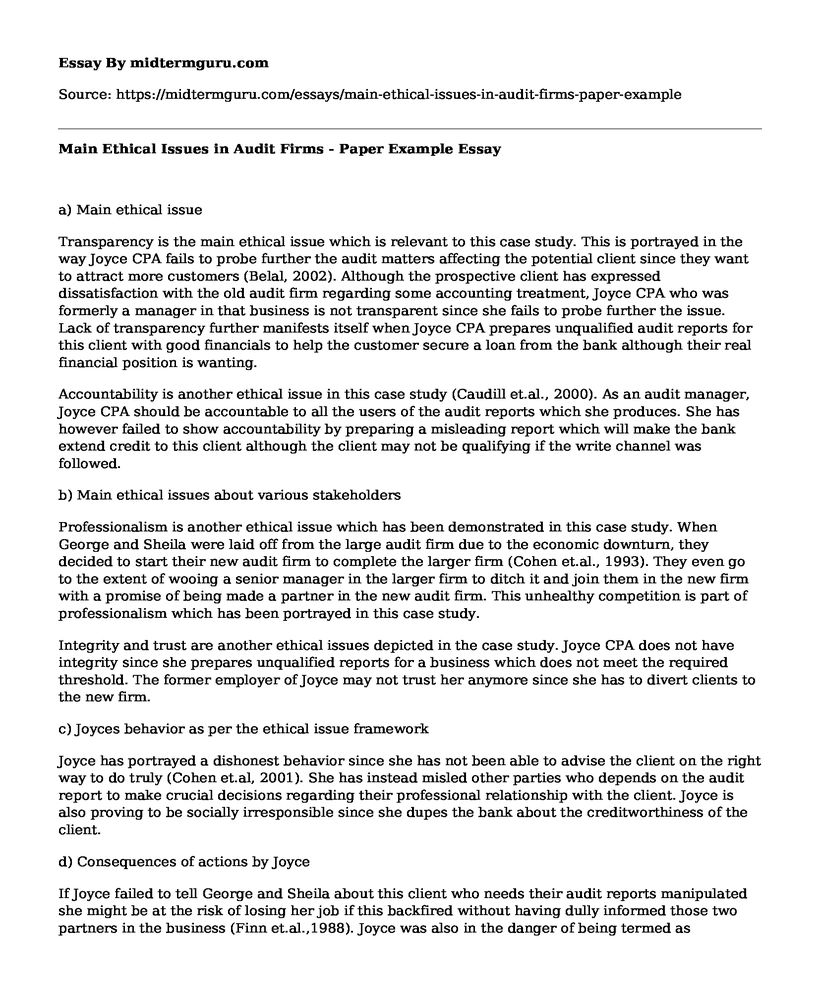a) Main ethical issue
Transparency is the main ethical issue which is relevant to this case study. This is portrayed in the way Joyce CPA fails to probe further the audit matters affecting the potential client since they want to attract more customers (Belal, 2002). Although the prospective client has expressed dissatisfaction with the old audit firm regarding some accounting treatment, Joyce CPA who was formerly a manager in that business is not transparent since she fails to probe further the issue. Lack of transparency further manifests itself when Joyce CPA prepares unqualified audit reports for this client with good financials to help the customer secure a loan from the bank although their real financial position is wanting.
Accountability is another ethical issue in this case study (Caudill et.al., 2000). As an audit manager, Joyce CPA should be accountable to all the users of the audit reports which she produces. She has however failed to show accountability by preparing a misleading report which will make the bank extend credit to this client although the client may not be qualifying if the write channel was followed.
b) Main ethical issues about various stakeholders
Professionalism is another ethical issue which has been demonstrated in this case study. When George and Sheila were laid off from the large audit firm due to the economic downturn, they decided to start their new audit firm to complete the larger firm (Cohen et.al., 1993). They even go to the extent of wooing a senior manager in the larger firm to ditch it and join them in the new firm with a promise of being made a partner in the new audit firm. This unhealthy competition is part of professionalism which has been portrayed in this case study.
Integrity and trust are another ethical issues depicted in the case study. Joyce CPA does not have integrity since she prepares unqualified reports for a business which does not meet the required threshold. The former employer of Joyce may not trust her anymore since she has to divert clients to the new firm.
c) Joyces behavior as per the ethical issue framework
Joyce has portrayed a dishonest behavior since she has not been able to advise the client on the right way to do truly (Cohen et.al, 2001). She has instead misled other parties who depends on the audit report to make crucial decisions regarding their professional relationship with the client. Joyce is also proving to be socially irresponsible since she dupes the bank about the creditworthiness of the client.
d) Consequences of actions by Joyce
If Joyce failed to tell George and Sheila about this client who needs their audit reports manipulated she might be at the risk of losing her job if this backfired without having dully informed those two partners in the business (Finn et.al.,1988). Joyce was also in the danger of being termed as underperforming could she not have informed the duo on the potential client who needs their services in the firm (Teoh et.al., 1996). On the other hand, Joyce would face the consequences of being laid off; she told George and Sheila how she had manipulated the reports for that client to make them credit worth since this could be very risky to their new audit firm.
e) Recommendations to Joyce
Joyce should uphold good moral values which will assist her to maintain professionalism in the course of her work. Honesty, integrity, professionalism, accountability and transparency are some of the ethical issues which Joyce need to uphold.
References
Belal, A. R. (2002). Stakeholder accountability or stakeholder management: a review of UK firms' social and ethical accounting, auditing and reporting (SEAAR) practices. Corporate Social Responsibility and Environmental Management, 9(1), 8-25.
Caudill, E. M., & Murphy, P. E. (2000). Consumer online privacy: Legal and ethical issues. Journal of Public Policy & Marketing, 19(1), 7-19.
Cohen, J. R., Pant, L. W., & Sharp, D. J. (1993). Culture-based ethical conflicts confronting multinational accounting firms. Accounting Horizons, 7(3), 1.
Cohen, J. R., Pant, L. W., & Sharp, D. J. (2001). An examination of differences in ethical decision-making between Canadian business students and accounting professionals. Journal of Business Ethics, 30(4), 319-336.
Finn, D. W., Chonko, L. B., & Hunt, S. D. (1988). Ethical problems in public accounting: The view from the top. Journal of Business Ethics, 7(8), 605-615.
Teoh, H. Y., & Lim, C. C. (1996). An empirical study of the effects of audit committees, disclosure of nonaudit fees, and other issues on audit independence: Malaysian evidence. Journal of International Accounting, Auditing and Taxation, 5(2), 231-248.
Cite this page
Main Ethical Issues in Audit Firms - Paper Example. (2021, Jun 08). Retrieved from https://midtermguru.com/essays/main-ethical-issues-in-audit-firms-paper-example
If you are the original author of this essay and no longer wish to have it published on the midtermguru.com website, please click below to request its removal:
- Patient Safety and Quality Improvement - Paper Example
- Phenomenological Study in Leadership - Paper Example
- Strategies for Global Firms' Organizational Structure: Paper Example
- Paper Example on Organization Culture of Two Birds Apparel Company
- Essay Sample on Leadership Collaboration to Enhance Minimal Expenditure
- Maximizing Efficiency in Recreation, Sports, Business and Science/Technology - Essay Sample
- Development Models in Leadership: Categorizing Managers and Employees - Essay Sample







